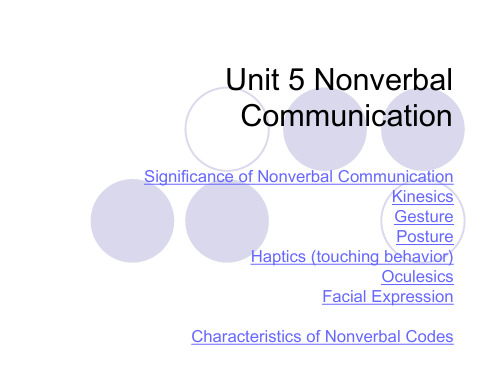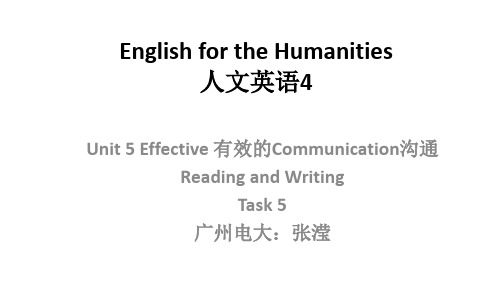Communication English unit5
- 格式:ppt
- 大小:395.50 KB
- 文档页数:47

Unit Five 重点短语检测1. 由于这个原因for this reason2. …的原因the reason for (doing) sth/ why从句3. 汉字的发展the development of Chinese characters4. 达到70亿reach seven billion5. 说本族言的人a native speaker6. 对…采取积极的态度take a positive/negative attitude towards/to…7. 因…而闻名be known for…8. 被称为…; 被认为;作为/以…而出名be known as…9. 参考书a reference book10. 指的是;查阅;提到refer to…11. 查字典refer to the dictionary12. 计算机系统a computer system13. 一路;自始至终;一直all the way14. 尽管…这一事实despite the fact that 从句15. 浮沉;兴衰;荣辱ups and downs16. 若干因素a number of factors17. 起初;在…初at the beginning (of…)18. 以…为基础,为根据be based on…19. 追溯到…date back (to ...)20. 成为…的象征become a symbol of…21. 将符号刻在骨头和贝壳上carve symbols on the bones and shells22. 导致某人做某事lead to sb doing sth23. 宋朝the Shang Dynasty24. 各种各样a variety of…/ varieties of…25. 主要因素之一one of the major factors26. 对…很重要(importance)be of great importance to sb/sth27. 主修;专门研究…major in…28. 不论…;不管…no matter where, who, what…29. 说广东话speak Guangdong dialect30. 沟通手段/交通工具a means of communication/transport31. 用这个方法by this means32. 借助…手段;依靠…方法by means of sth33. …与…有联系…be connected with…34. 被视为….; 被看成…be regarded as…be considered as/to be…35. 关于;有关…with regard to…/ regarding…36. 汉字Chinese characters37. 在古代/现代in ancient times/in modern times38. 学习中国书法learn Chinese calligraphy39. 成为中国文化的一个重要部分become an important part of Chinese culture40. 全球事务global affairs41. 取决于;依靠;依赖depend on…42. 越来越多的…(increasing)an increasing number of…43. 在…中起重要作用play a great role in (doing) sth44. 如果你能…我将感激不尽I’d appreciate it if you could…45. 充分意识到…的重要性fully appreciate the importance of (doing) sth46. 感激某人做某事appreciate one’s (doing) sth47. 欣赏经典作品appreciate classic works48. 查找特定信息find specific information49. 有人认为(believe) It is believed that 从句50. 那之后不久soon after that51. 发展成为…develop into…52. …对某人是一件难事…be a struggle for sb …is a big difficulty for sb53. 我最大的问题是…My biggest problem is…My biggest headache is …54. 奋力做某事struggle to do sth55. 与…作斗争struggle with/against…56. 努力争取…struggle for…57. 挣扎着站起来struggle to one’s feet58. 用本族语/ in one’s mother/native tongue59. 依某人看来from one’s point of viewin one’s opinion/ viewas far as one is concerned60. 在上/本/下学期last/this/next semester61. 乘地铁ride/take the subwayby subway62. 搬入新公寓move into a new apartment63. 一条新裤子a new pair of pants/trousers64. 恳求某人做…beg sb to do sth65. 过去常常做…used to do sth66. 习惯于做…be/get used to doing sth67. 英语得高分get high marks in English68. 只能听懂几个单词catch only a few words69. 获取大意get the main idea70. 你介意做…吗?Would you mind doing sth?71. 在…有很多困难have a lot of trouble with sth72. 等于;胜任be equal to…73. 消除(…与…之间的)差距bridge the gap (between… and …)74. 提出请求make a request75. 比某人年长/地位高be senior to sb76. 要求做某事demand to do sth…demand that从句(should) do/be done77. 非常需要;受欢迎的be in great demand78. 记住…keep sth in one’s head79. 有很大的词汇量have a wide/large vocabulary80. 增加你的词汇量increase your vocabulary81. 不知道(idea) have no idea82. 对…作详细的/简要说明give a full/brief description of…83. 难以形容描述的beyond description84. 与…有关; 涉及relate to…85. 与…有因果关系(与原因有关) be related to…86. 为某人打开一扇通往另一个世界的窗户open a window for sb to another world87. 除了…外(还) aside from…/ apart from…88. 开设课程offer courses89. 探索各种英语explore different kinds of English90. 提高噪门raise one’s voice91. 情不自禁做…can’t/couldn’t help but do sth can’t/couldn’t help doing sth92. 喜欢上;喜爱上be/fall in love with sb/sth93. 下一代,子孙后代next/future generations94. 起源于…(origin) have one’s origins in…originate from…95. 由…组成be made up of…96. 成为…与…的沟通桥梁act as a bridge between…and…Unit Five 重点短语检测1. 由于这个原因____________________________2. …的原因_______________________________3. 汉字的发展___________________________________________4. 达到70亿______________________________5. 说本族言的人___________________________6. 对…采取积极的态度___________________________________________7. 因…而闻名_____________________________8. 被称为…; 被认为;作为/以…而出名___________________________________________9. 参考书__________________________________10. 指的是;查阅;提到_____________________11. 查字典________________________________12. 计算机系统_____________________________13. 一路;自始至终;一直______________________14. 尽管…这一事实_________________________15. 浮沉;兴衰_____________________________16. 若干因素_______________________________17. 起初;在…初___________________________18. 以…为基础,为根据____________________19. 追溯到…_______________________________20. 成为…的象征___________________________21. 将符号刻在骨头和贝壳上___________________________________________22. 导致某人做某事________________________23. 宋朝___________________________________24. 各种各样_______________________________25. 主要因素之一__________________________26. 对…很重要(importance)____________________________________________27. 主修;专门研究__________________________28. 不论…;不管…__________________________29. 说广东话________________________________30. 沟通手段/交通工具____________________________________________31. 用这个方法______________________________32. 借助…手段;依靠…方法___________________33. …与…有联系_____________________________34. 被视为….; 被看成…____________________ _____________________________________________35. 关于;有关…____________________________36. 汉字____________________________________37. 在古代/现代______________________________38. 学习中国书法____________________________39. 成为中国文化的一个重要部分_____________________________________________40. 全球事务________________________________41. 取决于;依靠;依赖_____________________42. 越来越多的…(increasing)_____________________________________________ 43. 在…中起重要作用_____________________________________________44. 如果你能…我将感激不尽_____________________________________________ 45. 充分意识到…的重要性_____________________________________________ 46. 感激某人做某事_____________________________________________47. 欣赏经典作品____________________________48. 查找特定信息___________________________49. 有人认为(believe) _______________________50. 那之后不久____________________________51. 发展成为…____________________________52. …对某人是一件难事…____________________________________________________________ 53. 我最大的问题是…_______________________________________________________________54. 奋力做某事___________________________55. 与…作斗争___________________________56. 努力争取…___________________________57. 挣扎着站起来_________________________58. 用本族语______________________________59. 依某人看来_____________________________________________________________________________________________________________60. 在上/本/下学期_______________________61. 乘地铁________________________________62. 搬入新公寓__________________________63. 一条新裤子___________________________64. 恳求某人做…________________________65. 过去常常做…_________________________66. 习惯于做…___________________________67. 英语得高分___________________________68. 只能听懂几个单词_____________________69. 获取大意______________________________70. 你介意做…吗?________________________71. 在…有很多困难_______________________72. 等于;胜任___________________________73. 消除(…与…之间的)差距_________________________________________74. 提出请求_______________________________75. 比某人年长/地位高______________________76. 要求做某事_____________________________ ____________________________________________77. 非常需要;受欢迎的_____________________78. 记住…_________________________________79. 有很大的词汇量_________________________80. 增加你的词汇量__________________________81. 不知道(idea) ____________________________82. 对…作详细的/简要说明_____________________________________________83. 难以形容描述的__________________________84. 与…有关; 涉及____________________________85. 与…有因果关系(与原因有关) _______________86. 为某人打开一扇通往另一个世界的窗户_____________________________________________87. 除了…外(还)______________________________88. 开设课程_________________________________89. 探索各种英语____________________________90. 提高噪门________________________________91. 情不自禁做…____________________________ ____________________________________________92. 喜欢上;喜爱上___________________________93. 下一代,子孙后代________________________94. 起源于…_________________________________ ____________________________________________95. 由…组成_______________________________96. 成为…与…的沟通桥梁_____________________________________________ _____________________________________________。





英语第5单元作文,4年级Here is an English essay with over 1000 words, as requested. The title is "English Unit 5 Essay, Grade 4".Learning English is an exciting and rewarding journey for young students. In this essay, I will discuss the importance of English as a global language and the benefits of studying it in the fourth grade.English is spoken by over 1.5 billion people worldwide, making it the most widely used language on the planet. It is the official language of many countries, including the United States, the United Kingdom, Canada, Australia, and India. English is also the primary language of international business, diplomacy, science, technology, and popular culture.For fourth-grade students, learning English can open up a world of opportunities. As they begin to explore the global community, being able to communicate in English gives them a significant advantage. They can connect with peers from other countries, access a wealth of information and resources online, and better understand the diverse cultures and perspectives that shape our world.One of the key benefits of studying English in the fourth grade is the development of strong language skills. Students at this age are primed for language acquisition, and with the right instruction and practice, they can quickly build a solid foundation in reading, writing, speaking, and listening. This foundation will serve them well as they progress through their education and enter the workforce.In the classroom, fourth-grade English lessons typically focus on building vocabulary, improving grammar and sentence structure, and developing reading comprehension. Students may read a variety of fiction and non-fiction texts, engage in interactive language activities, and practice their writing skills through various assignments.For example, students might read a short story about a child from another country and then write a letter to that character, describing their own experiences and asking questions about the character's life. Or they might research a famous historical figure and create a multimedia presentation to share with the class. These types of activities not only improve language skills but also foster cultural awareness and critical thinking.Beyond the classroom, learning English can also have a significant impact on a student's personal and social development. As they interact with English-speaking peers, they learn important communication and collaboration skills. They also develop a greaterunderstanding and appreciation for diversity, as they are exposed to different perspectives and ways of life.Moreover, proficiency in English can open doors to future educational and career opportunities. Many top universities and colleges around the world require strong English language skills for admission and success in their programs. Similarly, many high-paying jobs in fields like technology, finance, and international relations often require fluency in English.Of course, learning a new language is not without its challenges. Fourth-grade students may struggle with pronunciation, grammar rules, and the sheer volume of vocabulary they need to master. However, with the right support and encouragement from teachers and parents, these challenges can be overcome.One effective strategy for supporting English language learners in the fourth grade is to create a language-rich environment both in the classroom and at home. This might involve reading aloud to students, exposing them to a variety of English media (such as movies, music, and podcasts), and providing opportunities for them to practice their skills through interactive games and activities.Additionally, teachers can differentiate instruction to meet the needs of individual students, providing extra support and scaffolding forthose who need it. This might include using visual aids, breaking down complex concepts into smaller, more manageable pieces, and offering one-on-one or small-group instruction.In conclusion, learning English in the fourth grade is a valuable and transformative experience for young students. As a global language, English opens up a world of opportunities for communication, cultural exchange, and personal growth. With the right support and instruction, fourth-grade students can develop a strong foundation in English language skills that will serve them well throughout their academic and professional careers. By embracing the challenge of learning English, these students are positioning themselves for success in an increasingly interconnected world.。
五年级英语书unit 5的作文是什么全文共3篇示例,供读者参考篇1Unit 5 in the fifth-grade English book focuses on various topics such as sports, hobbies, and activities. The unit introduces new vocabulary related to these topics and also includes grammar concepts such as the simple present tense and adverbs of frequency. The unit aims to help students expand their English vocabulary and improve their language skills through engaging activities and exercises.One of the main themes in Unit 5 is sports. Students learn about different sports such as soccer, basketball, and tennis. They also learn how to talk about their favorite sports, describe sports equipment, and discuss sports events. Through reading passages, listening activities, and writing tasks, students practice using the new vocabulary and grammar structures in context.Another topic covered in Unit 5 is hobbies. Students learn about various hobbies such as painting, dancing, and playing musical instruments. They also learn how to talk about their leisure activities, express preferences, and discuss hobbies withothers. By engaging in role-plays, group discussions, and creative writing tasks, students develop their communication skills and learn how to express themselves in English.Overall, Unit 5 in the fifth-grade English book is designed to help students improve their language skills in a fun and interactive way. By exploring topics related to sports, hobbies, and activities, students enhance their vocabulary, grammar, listening, speaking, reading, and writing skills. Through engaging activities and exercises, students become more confident and proficient in using English in real-life situations.篇2Unit 5 of the fifth grade English book is titled "Let's Celebrate." In this unit, students will learn about different celebrations and festivals around the world. They will also learn about the customs, traditions, and food associated with these celebrations.One of the celebrations students will learn about is Chinese New Year. They will learn about how it is celebrated, the significance of the Chinese zodiac animals, and the customs and traditions associated with the holiday. Students will also learnabout the traditional foods eaten during Chinese New Year, such as dumplings and fish.Another celebration students will learn about is Diwali, the Hindu festival of lights. They will learn about the significance of the festival, how it is celebrated, and the customs and traditions associated with it. Students will also learn about the different rituals and ceremonies that are performed during Diwali.In addition to learning about specific celebrations, students will also learn about the importance of celebrating diversity and respecting different cultures and traditions. They will learn about the value of inclusivity and acceptance, and how celebrating different festivals can help promote understanding and unity among people from different backgrounds.Overall, Unit 5 of the fifth grade English book provides students with a valuable opportunity to learn about the rich tapestry of celebrations and festivals that exist around the world. It encourages students to be open-minded, respectful, and appreciative of different cultures and traditions. By learning about these celebrations, students can broaden their horizons and develop a greater appreciation for the diversity that exists in our global society. This unit is not only educational but alsopromotes inclusivity and understanding, making it a valuable addition to the curriculum.篇3Unit 5 in the fifth-grade English book focuses on animals and their habitats. The unit introduces various animals like lions, zebras, elephants, and giraffes. Students learn about where these animals live, what they eat, and how they survive in their respective habitats. Additionally, the unit includes vocabulary related to animals, their characteristics, and the environments they inhabit.The unit starts with a reading passage about a safari park where students can observe wild animals in their natural habitats. This passage is followed by comprehension questions to test students' understanding of the text. Students also learn about the different parts of animals and their functions, such as the trunk of an elephant or the mane of a lion.One of the highlights of Unit 5 is a group project where students research and present information about a specific animal. They are encouraged to use their creativity and imagination to make their presentations engaging andinformative. This project allows students to practice their speaking skills and learn from their peers' presentations.Another key component of Unit 5 is a writing activity where students write a short paragraph describing their favorite animal. They are encouraged to include details about the animal's appearance, diet, and behavior. This activity helps students improve their writing skills and expand their vocabulary related to animals.Overall, Unit 5 provides students with a comprehensive understanding of animals and their habitats. Through a combination of reading, speaking, and writing activities, students develop their English language skills while learning about the fascinating world of wildlife.。
Unit 5Nonverbal communication课前谚语+名言:1、I’s not what he said, but the way he said it.——English saying2、There is a language in her eyes, her cheeks, her lips.——William Shakespeare案例一:个人空间马克最近从丹麦搬到了悉尼,在一家澳大利亚公司当销售员。
他被邀请加入当地的一个俱乐部。
有一天在一个晚会上,一个女成员走近他,马克立即通过谈论展现出了他的兴趣。
起初聊天进行的很顺利,但随着谈话的进行,马克逐渐的向她靠近,而那位女士似乎离他越来越远,并显得很不自在。
当马克正要问她有关于澳大利亚习俗的问题时,站在旁边的一个男士往这边瞟了一眼,她找了个借口离开,去和那个男人说话。
留下马克傻傻的站在那里,他不知道为什么他们的交谈如此突然地停止了。
Question:Why did that women suddenly stop talking with mark and turned to another man?注释:这是一个对身体距离理解不同造成的误会。
在丹麦,正式场合中,个人空间大概在20厘米-30厘米之间。
而在澳大利亚,这样的场合需要40厘米-50厘米的身体距离。
所以丹麦人习惯近距离交谈,澳大利亚人习惯远距离交谈。
在这个情况下,马克尝试去建立自己正常的个人亲密空间,侵犯了澳大利亚女士的空间,正因如此,她感到了某种威胁,失去了舒适感。
就在那时,身旁的男人给了她一个离开的机会。
如果马克对于澳大利亚人所期待的个人空间有所了解的话,或许这个谈话会有所不同。
案例二:使用当地语言的问题。
弗兰克为了做研究的目的从澳大利亚来到中国,为此,他在大学里刻苦学习中文,并且能用中文很方便的和人交流。
而当他到达北京以后,他开始和当地人交谈,询问方向和建议。
尽管他几乎都是用中文和他们交流,但是他发现周围的人有时候会笑着用英语回答他,尽管他们对英语知之甚少。
英语第五单元作文初二Sure, here's a sample essay for English Unit 5 for a second-year middle school student:---。
Title: The Impact of Technology on Teenagers。
In today's digital age, technology plays a significant role in the lives of teenagers. It affects various aspects of their lives, including communication, education, and socialization. In this essay, we will explore the positive and negative impacts of technology on teenagers.Firstly, technology has greatly enhanced communication among teenagers. With the advent of smartphones and social media platforms, teenagers can easily stay connected with their friends and family regardless of geographical distances. Social media platforms like Instagram, Snapchat, and WhatsApp allow teenagers to share moments of theirlives, communicate instantly, and build relationships. Moreover, technology has provided various communication tools such as video calls and messaging apps, enabling teenagers to interact in real-time, fostering friendships and connections.Secondly, technology has revolutionized education for teenagers. The internet serves as a vast repository of knowledge, providing access to information on virtually any topic. Teenagers can utilize online resources, educational apps, and e-books to supplement their learning outside the classroom. Additionally, technology has enabled interactive and immersive learning experiences through educational videos, simulations, and virtual reality. These innovative tools not only make learning more engaging but also cater to diverse learning styles, allowing teenagers to grasp concepts more effectively.However, despite its numerous benefits, technology also poses certain challenges for teenagers. One major concernis the excessive use of technology, leading to issues such as addiction and decreased physical activity. Teenagersoften spend long hours glued to their screens, whether it's browsing social media, playing video games, or watching online videos. This sedentary lifestyle can have adverse effects on their physical health, contributing to problems like obesity and poor posture. Moreover, excessive screen time can interfere with sleep patterns, affecting teenagers' overall well-being and academic performance.Furthermore, technology can impact teenagers' social development and mental health. While social media allows them to connect with others, it also exposes them to cyberbullying, online harassment, and unrealistic beauty standards. Constant comparison and validation-seeking on social media platforms can negatively impact teenagers'self-esteem and mental health. Moreover, the constant barrage of information and notifications can lead to anxiety and stress, affecting their ability to cope with daily challenges.In conclusion, technology has become an integral part of teenagers' lives, shaping how they communicate, learn, and socialize. While it offers numerous benefits such asenhanced communication and access to information, it also presents challenges such as addiction, sedentary behavior, and mental health issues. Therefore, it is essential for teenagers to strike a balance between utilizing technology for productivity and entertainment while also prioritizing their physical and mental well-being. Parents, educators, and policymakers must work together to promote responsible and balanced technology usage among teenagers, ensuring that they harness its potential while mitigating its negative impacts.--。